Thank you for visiting! By the way… any links on this page that lead to products on Amazon and other stores/partners are affiliate links Aquarium Store Depot earns a commission if you make a purchase.
Building the pond from scratch is a fun process, especially when it comes to choosing the best pond fish. There are a variety of fish species that can thrive in ponds, ranging from exotic koi fish to pond fish that look like sharks!
However, while choosing your pond fish, it’s vital to determine whether the fish would adapt to to the conditions of your area’s climate during winter. That’s because many aquarium fish are tropical and rarely do well in ponds, and vice versa. Other pond fish also get large and may not be suited for smaller ponds.
In this article, I’ll walk you through 7 of the best fish for your ponds. Not just that, I’ll discuss the cons of two very popular yet unsuited pond fish that you should definitely avoid. We have a video below from our YouTube channel if you want to watch and follow along with the blog.
The 7 Best Pond Fish
Using my years of experience, I’m listing the 7 best pond fish that stood the test of time, regardless of weather conditions or other circumstances.
1. Koi
It wouldn’t be wrong to say that the Koi are the king of ponds.
With their beautiful, colorful, and cylindrical bodies flexing gracefully, the Koi fish is a treat for sore eyes.
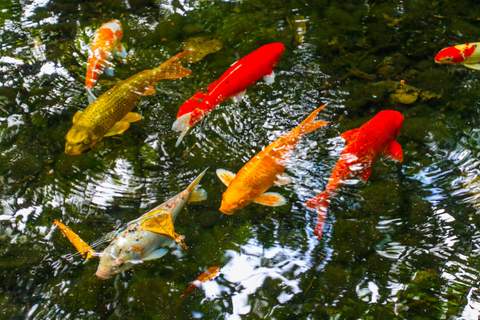
As for outdoor ponds, Koi is a perfect fit since it tends to grow very large if kept in optimal water conditions. Also, they are robust and strong fish that can withstand extreme winter and summer. However, while keeping Koi, consider the regular maintenance and upkeep of your ponds as they are much larger and difficult to maintain as compared to aquariums.
If you’re considering Koi for your garden ponds, you should know the following factors.
Cost
In the case of Koi, “The more costly, the rarer and less defective.”
Koi fish range from $15 for young to thousands of dollars for adult Koi or rare fish species. However, the price makes up for their extended lifespan. Koi, in healthy ponds, can live generally 25 – 35 years, provided that they are given nutritious food and quality water.
Size
Koi needs an Enriched Diet and a large environment to grow healthily and happily.
The ideal size for Koi ponds should be over 1000 gallons and three feet deep to provide the fish with everything they need. Most Koi Pond Kits are designed to build koi ponds to these specs
Additionally, if you’re planning to keep a shoal of fish, you will probably need a pond with over 3000 gallons.
Filtration System
The best thing about Koi is its hardiness against extreme conditions.
However, still, they are living beings that demand basic care and attention, you will need some additional installments, such as a pond filter to keep your pond Koi-friendly.
Protection in the Water
Koi are largely susceptible to predators and so you will need to cover your garden ponds with netting or electric fencing.
The best budget-friendly option is the addition of aquatic plants to provide shelter from the direct scorching heat of the Sun or deterring predators. Have your pond at least 3 feet deep is also great at keeping predators from getting to your prized pets.
That’s pretty much the gist of what you should consider before buying Koi fish for your garden ponds.
Still interested? I recommend purchasing your beautiful and healthy Koi with Next Day Koi that offers a broad variety of Koi at affordable prices.
2. Goldfish
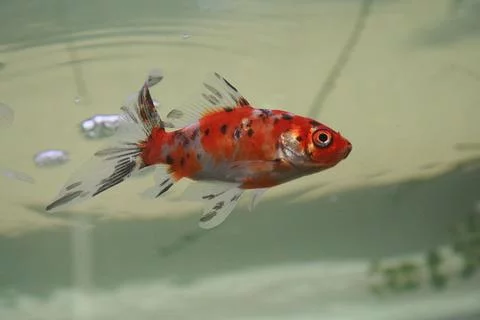
Like Koi, Goldfish also appreciates wholesome, well-aerated outdoor ponds.
Goldfish are small, hardy fish that does well in extreme temperatures. Hence, the perfect choice for your garden ponds. I recommend keeping the following important points in mind before going for Goldfish for your garden ponds.
Proper Location
Since Goldfish are cold water fish, you should provide a decent shade to your pond for maintaining the water temperature. However, in colder climates, there’s no need to cover the ponds as the warmth of sun perfectly balances the pond environment.
Size
The size of your outdoor pond should accommodate around 20 gallons of water per goldfish. Since Goldfish are smaller in size than Koi, they do pretty well in medium-sized ponds. However, make sure the fish swims freely without bumping into other mates or ornaments.
For Goldfish, a pond depth of 18 inches is all that is needed. They will do well in 3 feet deep ponds, they are just less demanding then Koi.
Water filter system
A good filtration system is essential for Goldfish ponds that deal with waste or leftovers to avoid spikes in toxic nutrient levels and stress. Most pond kits come with high quality filtration systems.
Mates
Goldfish are very social, docile, and amiable creatures that relish the presence of other fish. However, if you have got a pond already occupied with Koi, it’s better to examine the size of your Koi before getting Goldfish, as mature Koi sized with juvenile Goldfish usually don’t get along with and might end up killing them.
All in all, Goldfish need care, love, and dedication with water temperatures around 65 and 72 degrees Fahrenheit to thrive in your outdoor pond. Personally, my favorite is the Shubunkin Goldfish.
3. Chinese High-Fin Banded Sharks
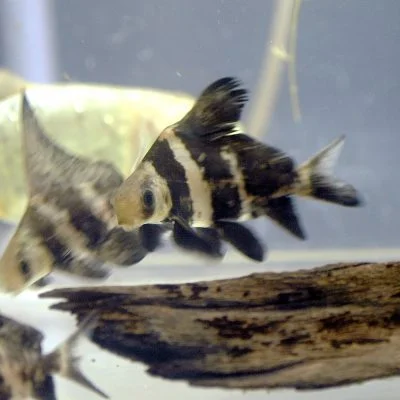
High Fin banded sharks are a popular freshwater fish species that are extremely unique and a must-have for pond keepers. And even though their name might scare you, trust me!
High Fin Banded sharks are not sharks at all!
There are your usual algae-eating freshwater fish with just a single row of pharyngeal teeth. We call them sharks because they have a long sharp-like fin at the top, which gives them a striking resemblance to the mighty sharks.
However, know that they require a larger pond area as they grow about 1.35 m (4 ft 5 in). Furthermore, the markings on High Fin banded sharks are majestic, making it a rewarding choice for your ponds.
They are difficult to find locally. I recommend purchasing online through one of the Best Online Fish Stores on my list.
4. Golden Tench
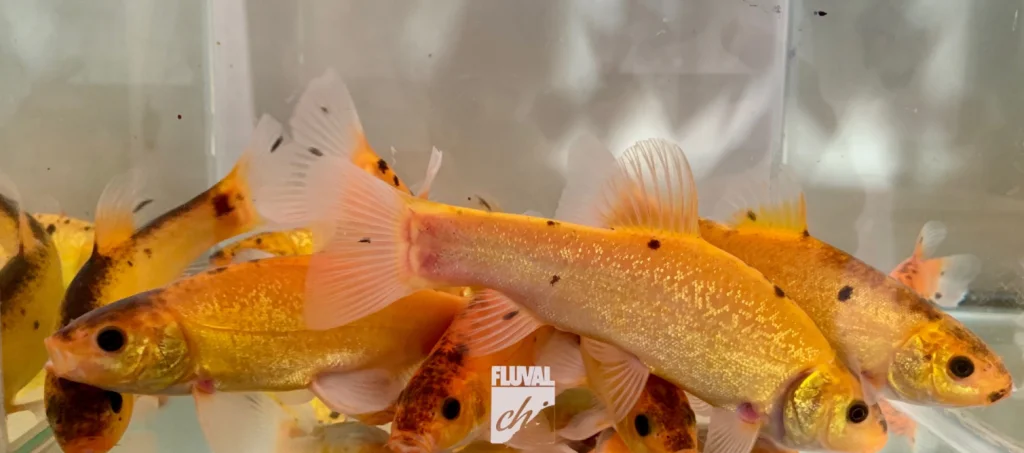
If you want friendly mates in the pond for your Koi, you should try Golden Tench (Source Pic).
Commonly known as the doctor fish, Golden Tench makes sure no fish in the pond falls ill. Legend has it, that the skin of Golden Tench contains an antibiotic that protects other fish from diseases.
I don’t claim that’s true, however, I know for the fact that Golden Tench cleans up water, which ultimately helps other fish to remain healthy in the pond.
Also, Golden Tench are tough fish and their life expectancy is around 15 – 20 years, making it a great fit for your garden ponds.
Here are some things you should consider before buying Golden Tench.
- The depth of your pond should be at least 28 inches
- Your pond should hold a good amount of aquatic plants to keep Golden Tench happy
- It’s never a good idea to overcrowd your pond when keeping Golden Tench
5. Sturgeon
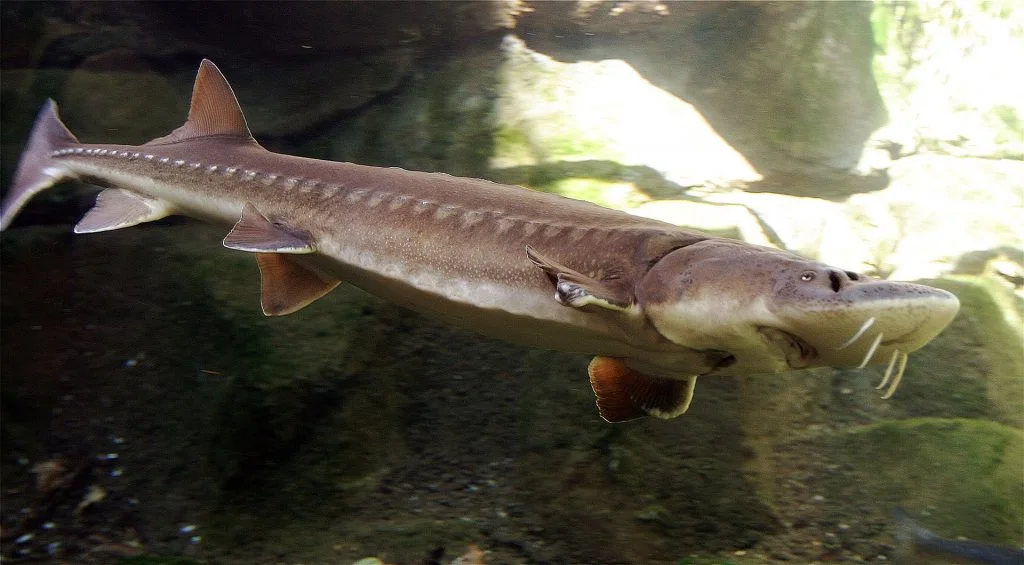
Sturgeon, an easy-going fish that may reach the age of over 50 or 100 years. They are popular in larger ponds and waterscapes.
At first glance, Sturgeon can be misunderstood with sharks – stronger and bigger with their mouths, underside. However, they are sensitive to sharp gravels and sand in the bottom of the pond.
The Sturgeon requires a large pond with proper filtration because they prefer a strong current. Also, a sturgeon needs special feed that sinks to the bottom with a strong odor that looks like natural feed.
If you’re thinking to get sturgeon as a beautiful pet for your ponds, here’s what you should consider.
- Keep the bottom of the pond clean because Sturgeons are bottom inhabitants, and so the accumulated dirt may cause gasification, causing harm to the fish.
- The Sturgeons require frequent feedings. They cannot digest most plant proteins so they need a high fish meal or shrimp meal content.
- Your pond should have a depth of at least 50 inches with minimal aquatic plants
All in all, there’s a rule of thumb to determine your pond size for Sturgeons; keep the pond size 10 times larger than the size of your fish to ensure maximum safety and health.
6. Minnows
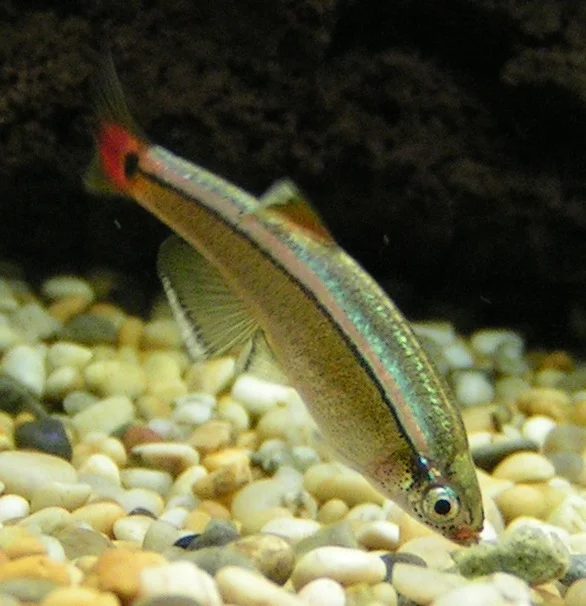
Minnows (picture source) are small fish that are great for smaller or patio pond setups. For large ponds, if you want your other pond fish to feed on something naturally, Minnows are a good choice. Minnows are an excellent source of food for other bigger pond fish that can live up to seven years and keep your pond ecosystem clean by eating larvae, reducing algae growth, and adding movement into your pond.
Out of various types of Minnows, the fathead minnow and white cloud mountain minnow the best suited for outdoors.
Fathead Minnow
Fathead Minnows display an appearance of light green or grey with a hazy spot on their dorsal fin. Fathead Minnows feed on insects, crustaceans, and zooplankton (algae), keeping your ponds clean and inviting for other fish. Therefore, they are suitable for outdoor ponds where the growth of algae is at its peak. Fathead Minnows are hardy creatures and can withstand extreme temperatures.
White Cloud Minnow
White cloud minnows are the smallest minnows you would ever find that grow up to 1.5 inches only. With their shiny green appearance and bright red fins, they add a moving effect to your backyard ponds.
Aquarists and pond owners usually keep white cloud minnow in ponds meant for frogs to be bred. White cloud minnows are omnivorous and feed on insect larvae and other aquatic plants.
Even though minnows are usually used for bait in garden ponds, there are a few things you should consider while choosing Minnows.
- Minnows need plenty of Oxygen. Hence, installing an oxygenator or waterfall is highly recommended
- Minnows are tiny fish and so they don’t need large ponds to survive
- Add lots of aquatic plants to provide shelter for your Minnows and to maintain the water temperature.
- Occasional food and treats increase the likelihood of fish survival. You can feed them fish flakes every once or twice a week
7. Guppies
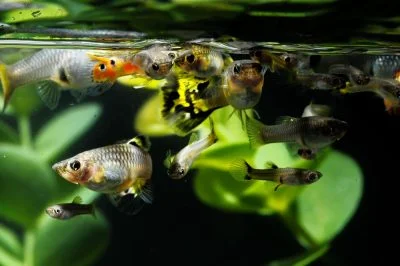
Guppies are small, bright fish species that thrive in outdoor pond as well as an aquarium.
Despite their small size, Guppies take up a lot of space for nonstop swimming hours. Since guppies are tropical fish, they enjoy warm waters with a temperature tolerance of up to 68°F (20°C). Therefore, your garden pond would keep them happy as long as it’s not chilly outside.
The peak months to keep your Guppies in the outdoor pond is between April and October when the water is warm enough to keep the fish healthy.
Even though you can keep Guppies in aquariums, they enjoy garden ponds as they are avid and active swimmers. Another advantage to keeping Guppies in ponds is that they receive more sunlight and nutritious food, keeping their skins bright and more colorful than ever.
Therefore, if you love small pond fish that add life to your pond, I suggest that you go for Guppies. There are a few things you should know about before considering Guppies as your pond inhabitant.
- Guppies enjoy clean water and so, the water filter is a must
- If you’re looking for long-term investment, note that they might not be the best choice because of their low life expectancy — 1 to 3 years
- Guppies are small fish species, but they require ample space for swimming around the pond, which makes them highly suitable for pond life
- Guppies are easy prey for the predators. Much larger pond fish will eat them
- You would need a fishnet to inspect the Guppies for potential diseases or overall health
What You Should Avoid
I know you might not agree with my disapproval of these fish species because they are popularly kept in garden ponds for so long.
Know that it’s not that I’m completely against keeping these fish species, it’s just that I don’t find it suitable for pond life.
1. Fancy Goldfish
Fancy goldfish come in a variety of types and make great aquatic pets. Check out these What You See Is What You Get (WYSIWYG) goldfish in the link below!
Fancy goldfish like Orandas have long, flowy fins with celestial color patterns to keep the visitors in awe. However, No matter how ‘fancy’ it gets, keeping fancy variants in ponds is a no-no.
I’ll tell you why.
Fancy goldfish are known for their slow, clumsy nature which is ill-suited for outdoor ponds, especially if you have other fish in the pond, such as Koi or single-tailed goldfish. Koi and non-fancy Goldfish will outcompete Fancy Goldfish for food. They are slow swimmers and will get left behind, starving for food. They are also highly prone to infections and diseases.
All in all, their fins are delicate that are easily damaged by other pond fish.
Therefore, I strictly advise you to avoid fancy goldfish and pick other hardy counterparts.
2. Catfish
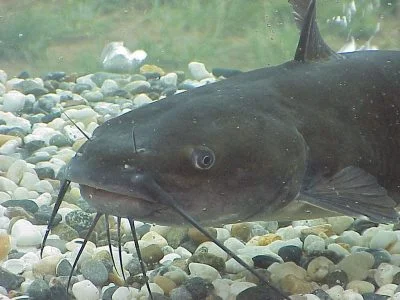
Keeping aquatic plants in ponds is every aquarist’s dream, and so is mine.
Which is what makes Catfish a bad fit for a pond. That’s because they are voracious eaters and destroy aquatic plants, turning the water cloudy with debris and plant waste.
FAQS
What kind can I group together in the water?
You have to look and research for fish that are hardy and can survive extreme temperatures. Also, fish that can adapt to indoor-outdoor life easily are highly recommended for ponds. Additionally, the temperament of fish matters the most as not every fish gets along with others really well.
The best pond fish are:
1.Koi
2.Goldfish
3.Chinese High Fin Shark
4.Golden Tench
5.Sturgeon
6.Minnows
7.Guppies
What kind can live in small outdoor water areas?
For small ponds, choose a variety of fish that is small and doesn’t require much space for swimming, For very small ponds Fathead Minnows and guppies are a good choice. Goldfish are also a great addition to smaller outdoor ponds.
What type can survive winter?
The fish that can survive winters in outdoor ponds are
1.Goldfish
2.Fathead Minnows
3.Koi
Can aquarium fish survive in this type of water?
Absolutely they can if provided with the right pond ecosystem and water conditions. Even though this factor varies from fish to fish, aquarium fish are usually tropical, therefore prefer warmer temperatures.
As long as you maintain the water temperatures, your aquarium fish should thrive in a pond.
What kind can live with a goldfish?
Goldfish is suitable for ponds and makes the best mates with the following two pond fish.
1.White cloud minnows
2.Young Koi
Final Thoughts
Fish are graceful, scaly creatures that add colors to your backyard ponds. Pond fish, despite being healthy and hardy, need some extra and special care regarding their habitat and food.
In this article, I’ve listed seven of the best pond fish species with their recommended care to add value to your pond.
- About the Author
- Latest Posts
I’m thrilled that you found Aquarium Store Depot! Here you’ll find information on fish, aquariums, and all things aquatics related. I’m a hobbyist (being doing this since I was 11) and here to help other hobbyists thrive with their aquariums! I adhere to a high quality Editorial Process and Review products with real life field usage and practical analysis.

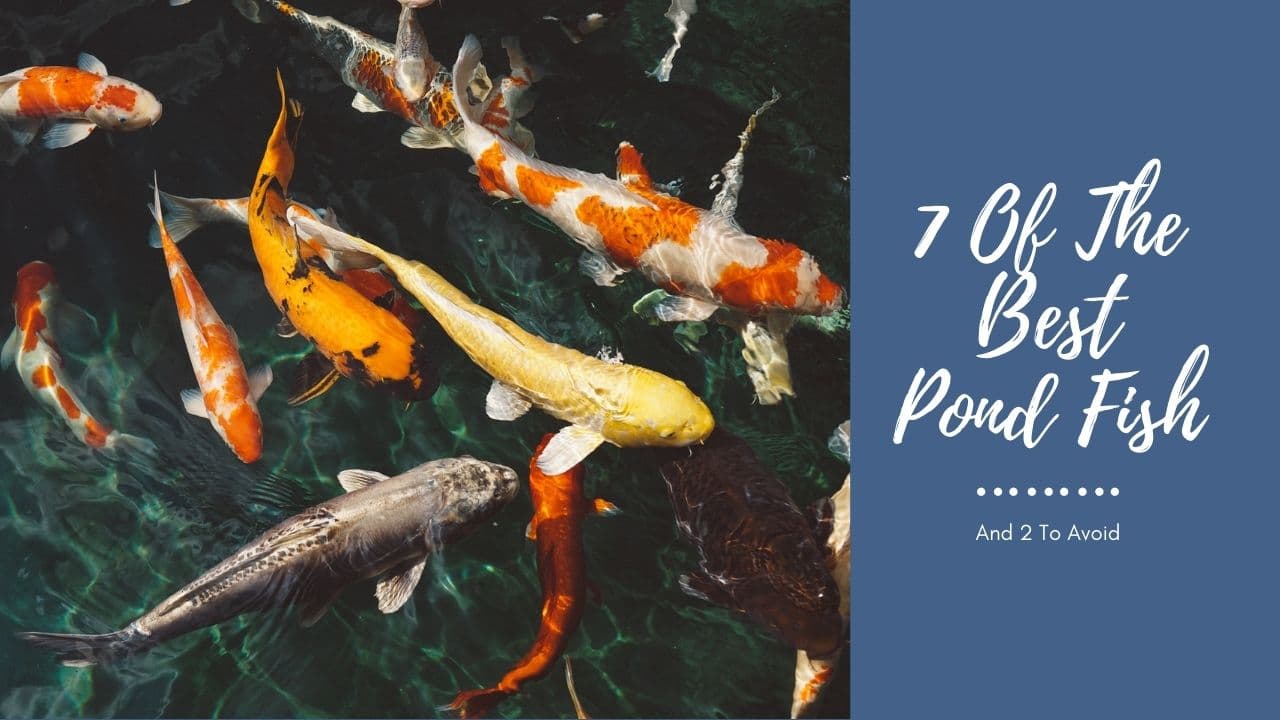

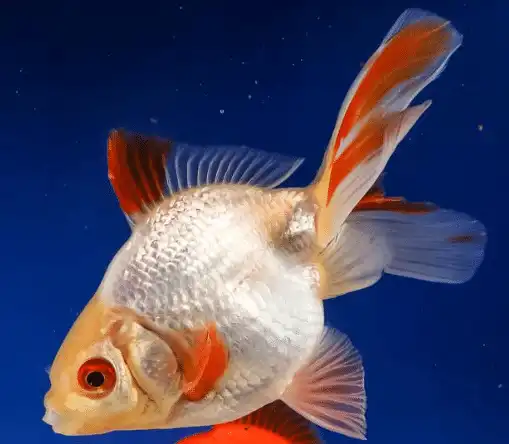




I live in north Texas. I have a backyard pond of about 2000 gallons: 150 sq. ft. surface, about 4 feet deep in center. Water temperatures range from about 40F in winter to about 90F in summer. Can you recommend fish (or mix of fish) for this environment?
Thanks,
Lelon
Koi or Goldfish. The deeper water will help with the temperature. Consider getting some shade as well for the summer times.
hi Mark,
I’m currently setting up a Blagdon fish pond size is 101cm by 101cm by 2′ deep holds 400ltr of water. I’m confused with conflicting information as to how many fish I can have in it. As the fish will be in it through uk winters iv invested in the heater to stop it from freezing. I was interested in goldfish but have been advised that 4 should be OK? could a bristlenose pleco survive with them? or another algae eater? or would minnows be better as they’re smaller? any advice would be appreciated
thankyou
di
That’s about 100 gallons US. Goldfish should be fine maybe 5-6 at most. Minnows would do good too. Plecos would be iffy
Great information, Mark. I have another question about pond fish. We have a smallish outdoor pond (approx. 5×12, 2’ deep). We had koi in our pond last year, but we are without fish this year. We would like to have water garden plants this year, but our previous experience was that the koi devoured anything green that floated. We are wondering if there is any type of fish that would help with algae that would not eat the plants.
Any information would be helpful and appreciated.
Thank you.
Hi Debbie. It depends on the type of plants. A best practice is to try floating plants or plants outside of the pond. Mosquito and Japanese Rice fish won’t eat your plants but are very small.